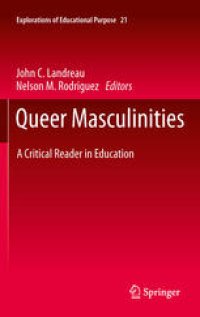
Ebook: Queer Masculinities: A Critical Reader in Education
- Tags: Sociology of Education, Gender Studies
- Series: Explorations of Educational Purpose 21
- Year: 2012
- Publisher: Springer Netherlands
- Edition: 1
- Language: English
- pdf
Queer Masculinities: A Critical Reader in Education is a substantial addition to the discussion of queer masculinities, of the interplay between queer masculinities and education, and to the political gender discourse as a whole. Enriching the discourse of masculinity politics, the cross-section of scholarly interrogations of the complexities and contradictions of queer masculinities in education demonstrates that any serious study of masculinity—hegemonic or otherwise—must consider the theoretical and political contributions that the concept of queer masculinity makes to a more comprehensive and nuanced understanding of masculinity itself.
The essays adopt a range of approaches from empirical studies to reflective theorizing, and address themselves to three separate educational realms: the K-12 level, the collegiate level, and the level in popular culture, which could be called ‘cultural pedagogy’. The wealth of detailed analysis includes, for example, the notion that normative expectations and projections on the part of teachers and administrators unnecessarily reinforce the values and behaviors of heteronormative masculinity, creating an institutionalized loop that disciplines masculinity. At the same time, and for this very reason, schools represent an opportunity to ‘provide a setting where a broader menu can be introduced and gender/sexual meanings, expressions, and experiences boys encounter can create new possibilities of what it can mean to be male’. At the collegiate level chapters include analysis of what the authors call ‘homosexualization of heterosexual men’ on the university dance floor, while the chapters of the third section, on popular culture, include a fascinating analysis of the construction of queer ‘counternarratives’ that can be constructed watching TV shows of apparently hegemonic bent. In all, this volume’s breadth and detail make it a landmark publication in the study of queer masculinities, and thus in critical masculinity studies as a whole.
Queer Masculinities: A Critical Reader in Education makes a substantial contribution to contemporary scholarship on gender and sexuality studies in education. Collectively the essays in this volume illuminate a broad range of queer practices and representations of masculinity in education, demonstrating that any serious study of masculinity must consider the theoretical and political contributions that the concept of queer masculinities makes to a more comprehensive and nuanced understanding of masculinity itself. In addition, Queer Masculinities encourages new approaches to educational theory and practice—while contributing more generally to knowledge production in the fields of critical masculinity studies and queer studies—by examining the complex interplay between queer masculinities and education.
The essays range from empirical studies to theoretical reflections, and address themselves to three separate educational realms: the K-12 level, the collegiate level, and the pedagogy of cultural production. Some of the essays focus on the disorienting presence of queer masculine student and teacher bodies in the K-12 or college classroom, and on the effects of queer performances of masculinity on classroom dynamics and on processes of learning. Others reflect on the challenges of actively queering pedagogical practice and research methodologies, and on its practical and theoretical rewards. Still others emphasize the cultural pedagogy of representations of queer masculinities in television, documentary film, and the novel, with special attention to the transformative possibilities inherent in those representations that challenge gender norms, or that make them strange or incoherent. Indeed, for many of the authors, the performative complexities of dislocating, “unmapping,” or “stealing” masculinity form the backdrop for an impassioned reflection on the cultural and pedagogical necessity of such an endeavor. In all, this volume’s breadth and detail make it a landmark publication in the study of queer masculinities, in critical masculinity studies as a whole, and in educational theory and practice.